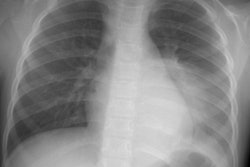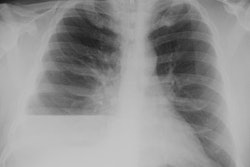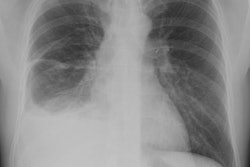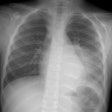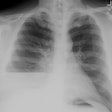AJR Am J Roentgenol 2000 Jul;175(1):245-9
FDG PET of pleural effusions in patients with non-small cell lung
cancer.
Erasmus JJ, McAdams HP, Rossi SE, Goodman PC, Coleman RE, Patz EF.
OBJECTIVE: We determined the ability of 18F-fluorodeoxyglucose (FDG) positron emission
tomography (PET) to differentiate benign and malignant pleural effusions in patients with
non-small cell lung cancer. MATERIALS AND METHODS: Over a 6-year period, we reviewed all
patients with primary non-small cell lung cancer and a pleural effusion on staging CT who
underwent FDG PET. We examined 25 patients (18 men and seven women; age range, 37-86
years; mean age, 65 years). FDG PET revealed positive findings if pleural activity was
greater than background mediastinal activity; FDG PET revealed negative findings if
pleural activity was the same as or less than background mediastinal activity. Results of
FDG PET were correlated with pathologic diagnosis determined with thoracentesis or pleural
biopsy. RESULTS: All patients had effusions on the same side as the primary tumor.
Twenty-two patients had a malignant pleural effusion confirmed with thoracentesis (n = 19)
or biopsy (n = 3). FDG PET revealed positive findings in 21 patients and negative findings
in one. Three patients had no evidence of malignancy in the pleural space determined with
cytologic findings (n = 2) or biopsy results (n = 1). FDG PET uptake revealed positive
findings in one of these patients and negative findings in two. Therefore, of 22 patients
with positive findings on FDG PET, 21 had pleural metastases, and of three patients with
negative findings on FDG PET, one had metastases. The sensitivity, specificity, positive
predictive value, negative predictive value, and accuracy of FDG PET for detecting pleural
metastases were 95%, 67%, 95%, 67%, and 92%, respectively. CONCLUSION: This study suggests
that FDG PET may be useful in improving staging evaluation in patients with non-small cell
lung cancer and a pleural effusion. Increased pleural FDG uptake usually indicates pleural
metastases; however, because the number of benign effusions studied was small, the
relevance of negative findings on FDG PET in this setting is uncertain.
PMID: 10882281
